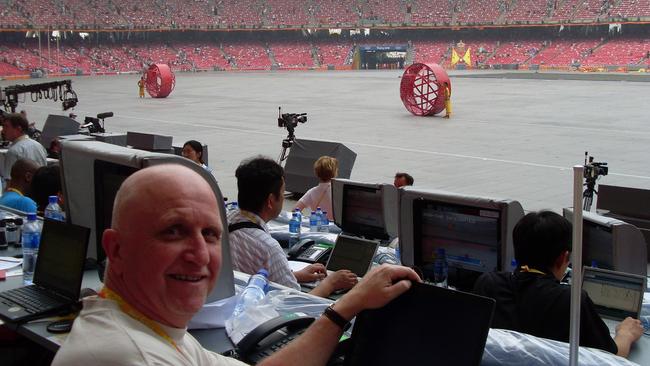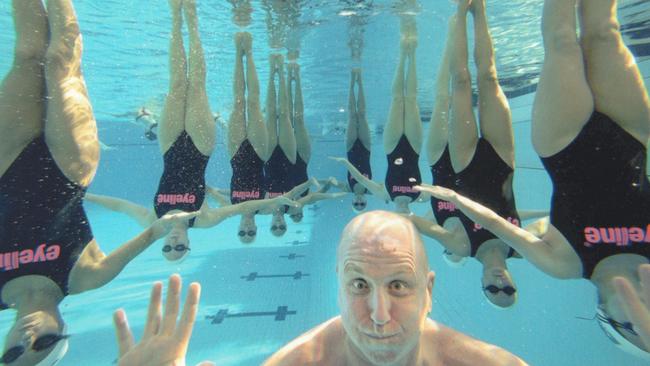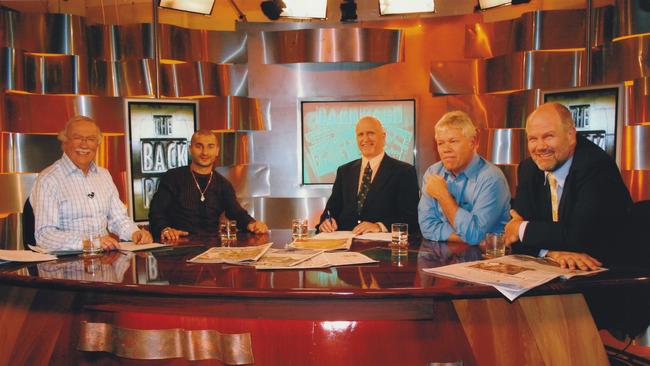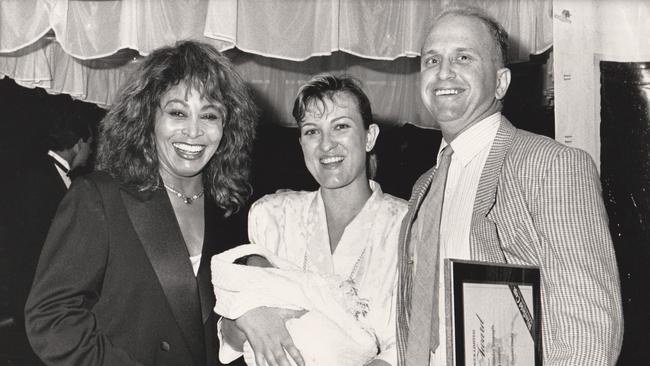After 47 years as a journalist, the past 23 as a sports columnist on the Sunday Mail, Mike Colman is hanging up his pen after an award-winning career which included seven Olympic Games. Robert Craddock went down memory lane with him.
Does it feel strange leaving this week as the world swirls with the coronavirus pandemic?
As you know Crash, timing is one of my great strengths. Only I could leave when every morning my super has gone down thousands of dollars overnight. My wife Linda told me that I should have warned self-funded retirees around the country that I was joining them so they could have cashed out their shares.
You perfected the rare art of being funny in print. How did you manage that?
I suppose I have always been a smart arse. I was always the kid at school who tried to make everyone laugh and that included writing funny essays and school plays. When I started to read newspapers I was drawn to the columnists like Mike Gibson, Bill Casey and Ron Saw. There were some American and English sportswriters I liked too. I really studied them. I’d cut out my favourite columns and store them in a shoe box. When Bill Casey died I wrote that he was one of a breed of columnists who could make you laugh on Wednesday and cry on Saturday. That’s what I wanted to be.
So who was your main influence?
Mike Gibson. I loved him. He was my idol. Getting to work with him was such an honour. Those guys could be cynical and funny but there was emotion there too. No-one ever wrote a column about finding a stray cat on the way home from the pub better than Gibbo.

Which of your own stories moved you the most?
One day I took my kids to play in a park at St Johns Wood and saw a memorial on a rock to the memory of a World War II navigator named Clifford Hopgood who was killed when his Lancaster bomber was shot down over France. It stayed with me and I finally got the chance to write about it when I worked for Qweekend 10 years later. The story won a Walkley Award and the daughter of one of the men on the flight read it and gave me his diary which led to me writing a book, Crew, about everyone who was on the plane that night. Researching the book took me to France and England. From seeing the memorial to finishing the book took 16 years. It was the most influential story on my life, all from that chance visit to the park.
What about your exclusive story on Don Bradman’s death?
Ah yes. I had a mate who sent a letter to Bradman asking if he would do something for charity and he got a letter back saying “I’m really sorry, I have got to the stage where I can’t do this sort of thing any more. I am not sure how much longer I have.’’ He gave me a copy of the letter which I showed to the editor and we had a front page banner headline: “Don Bradman close to death.’’
When did you start to worry it might not have been on the money?
When a massive group of television reporters set up outside his house in Adelaide the next morning and they had to move because The Don drove into his driveway, jumped out of the car and grabbed his golf clubs from the boot. He said “what’s this all about?’’ They said “we heard you were dead’’ and he replied “I’ve just played 18 holes ... leave me alone.’’ But I was right. He did die ... nine years later. I was first with the news.
Have you finally given up on a possible NRL return for your beloved North Sydney Bears?
No. What are you saying? Hey Crash, we either do this seriously or not at all. I’d appreciate it if you asked proper questions thanks. There are worse teams going around now than the North Sydney Bears. Gee whiz. Fair dinkum ...
That was a club ruined by bad management. They should have gone to Super League. They would have had three premierships by now ... instead of just two.

Apart from the Bears who were your favourite team?
The Australian synchronised swimming team. I went down and did a story on them before the 2000 Olympics and they were so sweet and lovely. I always called them Australia’s version of the Jamaican bobsled team. They were absolute battlers and just beautiful girls. I sort of became their mascot.
You wrote Fatty Vautin’s huge selling biography. What was that like?
Bloody Fatty. It was the first book I wrote and it ruined me. It was like winning big on your first day at the races and thinking it’s going to happen every time. It was the No.1 bestseller in the country and sold more than 80,000 copies and actually made some money. So I thought “how easy is this?’’ I have written another 14 books since and haven’t made a cent.
What was the best piece of advice you got as a sports writer?
I had a sports editor at The Sunday Telegraph named Ian McKinnon who said to me that I was in a privileged position. He said, “You can go to the places the readers can’t so you have to take them there. You have to be their eyes.” Another time he had a blue with the editor who knocked back a trip I wanted to take. I tried to calm him down by saying, “oh well, he’s the boss.” He told me, “He’s not your boss. Your boss is the person that puts their hand in their pocket to buy a paper.” That’s always stuck with me.

You broke the massive story on Wally Lewis being sacked as Broncos captain. How did you get that one?
It was 1989 and a mate of mine who was ordering a drink at a bar overheard a Broncos director saying they were going to sack Wally. He rang me the next morning and said “you are not going to believe this ...’’. I wrote it initially in a gossip column and it copped a lot of flak, then one of Wally’s teammates rang and told me it was 100 per cent true so then we went really big on it.
Copping flak is part of the job, isn’t it?
It is. I remember during the 2015 Ashes tour in England I wrote a story saying that Michael Clarke was unpopular with the other players and that some of the WAGS couldn’t stand each other. It really blew up. Clarke was on radio back in Australia saying it was all rubbish and team management weren’t happy. The next day the tour headed off for a county game. I didn’t go because I was needed back in London. I was told that when all the other journos were standing around on the side of the field waiting to interview some of the players before the match someone asked, “Where’s Colman?” and Peter Lalor from The Australian answered, “he’s gone into the witness protection program.”

What was the biggest story you covered?
Probably the Super League War. Every morning you’d head into work thinking, “what’s going to happen today?” It was a huge adrenalin rush. It was tricky because our employer News Corp was a key player. I remember sports editor Phil Rothfield and I got called in by our editor Roy Miller on day one and told, ‘this is going to be bad but my only instruction is that you are fair. If you say something about one side, give the other a chance of replying.” I was lucky because I got along well with both sides. I spent the whole day of the court decision with Ken Arthurson, John Quayle and ARL lawyer Colin Love at ARL headquarters and walked to court with them to write a colour story. It was incredible access.
What was the most over-rated event you ever covered?
The Atlanta Olympics. They were terrible. As you know buses are so important at Olympics. I remember they were a shambles at Barcelona in ‘92 and the Mayor held a press conference and said, “there are only three things wrong with the transport - the buses, the drivers and the routes.’’

Was Atlanta worse?
Much worse. They used these old school buses brought in from all around America which looked as if they had been donated by the Partridge Family. They would break down and be towed to giant junk yards which were like the last resting places for dead buses. And it seemed every person in America decided they were going to get rich by selling fake medals and Olympic torches on every street corner. Then there was the bombing in which a woman tragically died. The whole thing was a disaster. Luckily the next Games were Sydney which were so good. I reckon Sydney saved the Olympics.
Were they your favourite Olympics?
Sydney, Athens, London and Rio were all good but Sydney was special. It was my third Olympics and I hit the ground running and had pretty much carte blanche. Every afternoon Phil Rothfield or one of the other bosses would ask where I wanted to go the next day. I could go wherever I wanted and they weren’t always the biggest events. I heard Bill Gates was coming out from America just to go to the table tennis because he liked to play it so I went out there and wrote a funny column. I reckon I was at just about every gold medal Australia won. Sailing, cycling, beach volleyball on Bondi Beach … it was incredible to have such opportunities.
And the standout memory from those Games?
There’s two. First was the men’s 4x100m freestyle relay when Ian Thorpe powered over the top of Gary Hall Jnr to take gold. As you know journalists aren’t supposed to barrack. It’s not the done thing, but by the finish we were all jumping up and down and screaming GOOOOOOOOOOO then hugging and high-fiving each other. The other one was Cathy Freeman’s win. I’ll never forget seeing the flashlights on thousands of cameras going off as she ran around the track. I also really enjoyed covering the careers of Kieren Perkins and Grant Hackett. I ended up writing a book about the history of the 1500m.

And what about Usain Bolt. A quirky memory?
I saw all of his gold medals but when he won his first 100m in Beijing it was an amazing night. I was still on a high walking back to our office and I remember when I got there our chief photographer going through the photos and saying, “hang on, have a look at this’’. We crowded around his computer and saw that Bolt had won that race with one of his shoelaces undone. After winning in London Bolt took the camera off a photographer and started taking pictures himself. He was just such a character.
You were a Sydneysider yet you came to Brisbane and had to write a lot of pro-Maroon copy. Was that difficult?
My wife Linda is from Brisbane so I always say I’m a Queenslander by osmosis, plus the Bears seemed to produce more Queensland players than any other team bar the Broncos - Boustead, Kiss, Larson, Moore etc. Also, from day one I was a huge Wally Lewis fan because for a sports writer he had everything. He said he hated the media but he always gave you something. It was hard at first but I remember proudly showing Linda a letter I got from someone who wrote, “you are just a typical one-eyed Queenslander Colman.’’ I told her, “I’ve made it, they hate me in NSW.”

You were fortunate to see and do so much in your career.
Absolutely I was, but I was blessed to have Linda’s support. We had four beautiful young kids who were all born within months of either a Commonwealth Games or Olympics and I would say, “I won’t be able to go” but she’d say, “no, it’s your job, you have to go.” So I dragged myself away and covered the best sports events in the world. I took one for the team. I was good like that.
Mike, it’s been an honour to work with someone whose writing skills and ability to make people laugh was the envy of us all. Well played.
Thank you Crash. It’s been so good to work with so many great people. You’re only as good as the ones around you, the editors who back you up and support you in good times and bad, the subs who pick up your mistakes and your fellow journos who make it fun. I’d also like to thank the readers, so many of whom have written to me over the years to tell me what they have liked - and not liked. I feel like we’ve all been on a journey together. I dreamt of doing this when I was a kid and it has been better than I could have ever imagined.


Add your comment to this story
To join the conversation, please log in. Don't have an account? Register
Join the conversation, you are commenting as Logout
WATCH: NRL’s referee KPI scoring system revealed
The NRL has opened its doors like never before, with PHIL ROTHFIELD given an exclusive behind the scenes look at the sophisticated scoring system that decides which referees control the biggest fixtures. WATCH THE VIDEO.
Blueprint: Inside Madge tweak that’s unlocked potent Broncos attack
Brisbane has gone from crisis mode to a genuine premiership threat thanks to a small tweak to their attacking game plan. We analyse how Michael Maguire finally unlocked his arsenal of weapons.